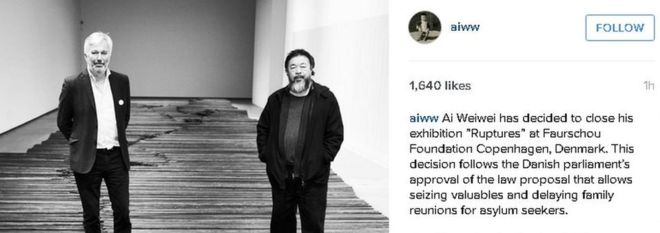Artist closes Denmark exhibit in protest against asset seizures

Danish police will be able to seize valuables worth more than 10,000 kroner (1,340 euros; £1,000) from refugees to cover housing and food costs.
The proposal was backed by the country`s parliament on Tuesday.
MPs also approved plans to delay family reunions for asylum seekers. Mr Ai also said he was protesting against this.
His Ruptures exhibition has been running since March 2015 and was expected to end in April 2016.
The gallery`s owner, Jens Faurschou, said he backed the artist`s decision and expressed his own disappointment at the government`s decision.
He told the BBC: "It`s making a picture of Denmark and the Danes as a terrible country. As a Danish passport holder, which I always have been happy to be, I am not happy today."
Mr Faurschou said Mr Ai was "shocked" when he called him on Wednesday morning from Lesbos after spending the night reading the news.
"When he lived in China, he pointed to the problems there. Now he lives in Europe, he points to the problems here. He has a global voice," he said.
Earlier this month, Mr Ai opened a studio on the Greek island of Lesbos, saying he wants to raise consciousness about the plight of refugees through art.
The studio, staffed by his students from China and Germany, will produce several projects with themes related to the refugee crisis.
The migrants` assets law adopted by Denmark has been widely criticised by human rights groups and by the UN.
Amnesty International regional director John Dalhuisen described the vote as "mean spirited".
The prospect of refugees having possessions seized has drawn comparisons to the confiscation of valuables from Jews during World War Two.
The government has said that items of sentimental value, such as wedding rings, will be exempt. It also raised the amount refugees will be allowed to keep from 3,000 kroner to 10,000 following objections.
The government has said that the policy brings refugees in line with unemployed Danes, who also face having to sell assets above a certain level to claim benefits.
However, critics have said that many Danes have unemployment insurance that saves them having to sell assets, and anyway would not face the kind of searches proposed under the new law.
The new measures also mean the period migrants will have to wait before applying for relatives to join them will be extended from one year to three - a move aimed at discouraging new arrivals.
Temporary residence permits will be shortened and the conditions for obtaining a permanent permit will be restricted.
Denmark received more than 21,000 asylum seekers in 2015.
"I left with nothing ... if I had jewellery, I wouldn`t be here"
Denmark is not the first European country to demand the assets of asylum seekers.
Earlier this month, Switzerland was criticised by a refugee group for seizing assets from some 100 people in 2015. Under Swiss rules, asylum seekers have to hand over assets above $1,000 (£700; €900).















































